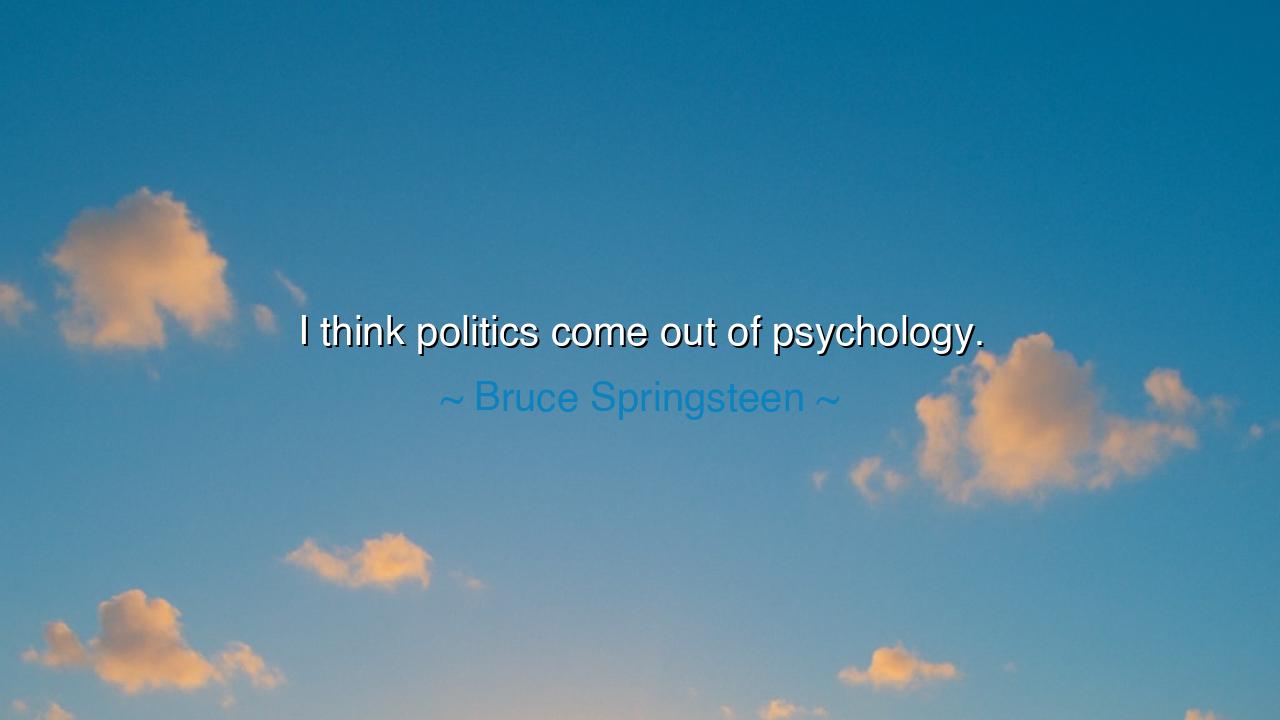
I think politics come out of psychology.






When Bruce Springsteen declared, “I think politics come out of psychology,” he peeled back the surface of power to reveal its hidden root. His words remind us that politics is not only about parties, laws, or institutions, but about the human heart—its fears, its desires, its need for belonging. Every law passed, every movement born, and every leader raised up springs first from the soil of psychology, from the restless minds and souls of the people.
The ancients themselves understood this truth. Plato taught that the city is the soul writ large—that the character of the polis reflects the character of its people. If the citizens are just, the city is just; if the citizens are corrupt, the city falls into ruin. Springsteen’s words echo this ancient wisdom: that the outward struggles of politics cannot be separated from the inner struggles of those who shape it.
History proves the point. The rise of fascism in the 20th century was not born merely from economic collapse, but from the psychology of fear, anger, and wounded pride that spread among the people. Likewise, the Civil Rights Movement in America was not only political; it was psychological—a reclamation of dignity, a healing of long-denied humanity, a refusal to accept inferiority. In both triumph and tragedy, the inner life of individuals gave birth to movements that reshaped nations.
Springsteen, the troubadour of working people, spoke from this deep well. He saw in the struggles of factory workers, farmers, and forgotten communities that politics arises from their sense of self-worth, their hope or despair, their confidence or their fear. A policy may be written in ink, but its power lies in the emotions it awakens or soothes, the psychology it feeds or starves.
Thus, let this wisdom endure for future generations: to understand politics, one must first understand the heart of man. Behind every vote is a longing, behind every protest is a wound, behind every revolution is a dream. Leaders who ignore this truth will govern blindly; but those who grasp it will know that the key to lasting change is not only in the laws they pass, but in the minds and spirits they lift. For truly, as Springsteen declared, politics come out of psychology, and in the soul of the people lies the destiny of the nation.






XTLe Xuan Truong
This quote from Springsteen prompts a reflection on the psychological underpinnings of political movements. Is it possible that certain political ideologies gain traction because they appeal to fundamental psychological needs, such as the need for power, security, or belonging? If we acknowledge that politics comes from psychology, does it mean we need to focus more on emotional intelligence in politics, especially in how politicians communicate with the public?
HPnguyen Huu Phuoc
Springsteen’s statement about psychology influencing politics seems to suggest that political views might not always be as logical as we think. Are people’s political opinions primarily based on emotion and mental frameworks rather than facts and reason? Could this explain why some political ideologies become so deeply entrenched in societies? How do we shift from psychology-driven politics to a more balanced, rational political discourse?
HLHue Le
This quote brings up an interesting point about how psychology influences the political landscape. If politics comes from psychology, does that mean political leaders are tapping into collective psychological needs, like a desire for safety or identity? How does this shape the way political messages are framed? Does understanding the psychological factors behind political movements allow us to manipulate or better understand their influence on the public?
KNSiu Ksor Nhung
Springsteen’s comment is intriguing because it implies that political decisions may stem from psychological motivations rather than purely rational ones. How much of a person’s political affiliation is driven by subconscious factors, such as fear, insecurity, or a need for belonging? If psychology plays such a central role, how can we address the biases and emotional triggers that influence political decisions, potentially leading to more thoughtful and less reactive political engagement?
HTHanh Truong
Bruce Springsteen's quote suggests a deep connection between psychology and politics. It makes me think: are political ideologies and behaviors truly shaped by the psychological makeup of individuals and societies? How much do emotions, perceptions, and mental frameworks drive political decisions? Could understanding psychology help us understand why certain political ideologies resonate with people, or is it an oversimplification of the complex factors at play in politics?